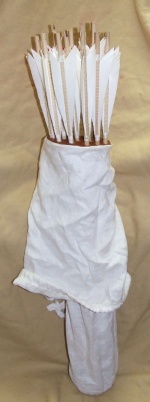Arrow bag: Difference between revisions
No edit summary |
No edit summary |
||
| (4 intermediate revisions by the same user not shown) | |||
| Line 1: | Line 1: | ||
[[image:arrowbag.jpg|right|150px|thumb|Replica 15th century arrow bag with |
[[image:arrowbag.jpg|right|150px|thumb|Replica 15th century arrow bag with two dozen bound arrows.]] |
||
An '''arrow bag''' is a modern term used to describe the container used to transport and distribute [[medieval]] [[arrow]]s during a [[battle]]. Very commonly depicted in [[15th century]] manuscripts if a container for arrows is to appear. Depictions vary from a soft [[fabric|textile]] bag with a soft body to a container which appears to be made of wicker with a white [[fabric|textile]] covering. In both cases, the covering is likely to be of [[linen]], possibly |
An '''arrow bag''' is a modern term used to describe the container used to transport and distribute [[medieval]] [[arrow]]s during a [[battle]]. Very commonly depicted in [[15th century]] manuscripts if a container for arrows is to appear. Depictions vary from a soft [[fabric|textile]] bag with a soft body to a container which appears to be made of wicker with a white [[fabric|textile]] covering. In both cases, the covering is likely to be of [[linen]], possibly [[wax]]ed. |
||
The soft bodied version appears to have a drawstring opening at the [[nock]] end of the [[arrow]], and sometimes the base. Their appears to be a [[leather]] spacer for the holding the [[arrow]]s apart to preserve the [[feather|fletching]]. This is also supported by the [[16th century]] [[Mary Rose]] find where such spacers have been found in situ. They appear to hold approximately two dozen arrows. In transport, these type may have been contained in barrels. |
The soft bodied version appears to have a drawstring opening at the [[nock]] end of the [[arrow]], and sometimes the base. Their appears to be a [[leather]] spacer for the holding the [[arrow]]s apart to preserve the [[feather|fletching]]. This is also supported by the [[16th century]] [[Mary Rose]] find where such spacers have been found in situ. They appear to hold approximately two dozen [[arrows]]. In transport, these type may have been contained in [[barrels]]. |
||
The [[wicker]] versions appear quite large and probably also had [[leather]] spacers. None of these type have been found, but |
The [[wicker]] versions appear quite large and probably also had [[leather]] spacers. None of these type have been found, but it appears that they might have held twice as many [[arrow]]s. |
||
On the battlefield, such arrow bags may be been relayed to archers from the supply train or a closer store where needed. |
On the battlefield, such arrow bags may be been relayed to the ground near [[longbowman|archers]] from the supply train or a closer store where needed. [[longbowman|Archers]] then appear to have collected their [[arrow]]s and tucked them under their [[belt]]s until they were ready to be shot. |
||
[[category:weapons]] |
[[category:weapons]] |
||
[[category:archery]][[category:artefact (medieval)]] |
|||
Latest revision as of 18:34, 10 September 2006
An arrow bag is a modern term used to describe the container used to transport and distribute medieval arrows during a battle. Very commonly depicted in 15th century manuscripts if a container for arrows is to appear. Depictions vary from a soft textile bag with a soft body to a container which appears to be made of wicker with a white textile covering. In both cases, the covering is likely to be of linen, possibly waxed.
The soft bodied version appears to have a drawstring opening at the nock end of the arrow, and sometimes the base. Their appears to be a leather spacer for the holding the arrows apart to preserve the fletching. This is also supported by the 16th century Mary Rose find where such spacers have been found in situ. They appear to hold approximately two dozen arrows. In transport, these type may have been contained in barrels.
The wicker versions appear quite large and probably also had leather spacers. None of these type have been found, but it appears that they might have held twice as many arrows.
On the battlefield, such arrow bags may be been relayed to the ground near archers from the supply train or a closer store where needed. Archers then appear to have collected their arrows and tucked them under their belts until they were ready to be shot.
